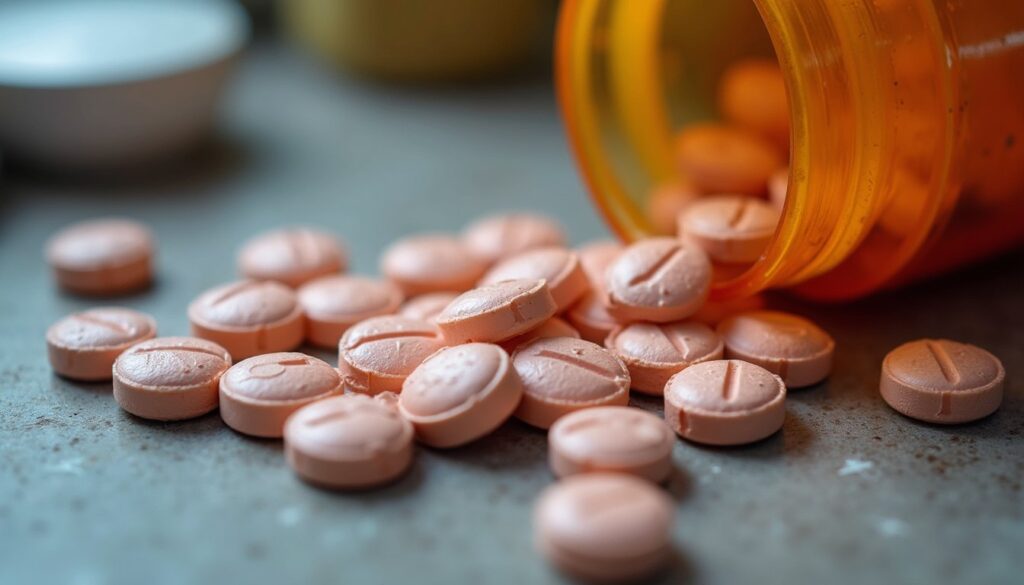Three early warning signs indicate you’re developing a Valium dependence that requires professional intervention. Initially, you’re taking it more frequently or at higher doses than prescribed, often seeking multiple prescriptions. Second, you feel unable to function normally without the medication, experiencing declining work performance and social withdrawal. Third, you’re experiencing anxiety, tremors, or physical discomfort when you miss a dose, signaling your body has become dependent. Understanding how these symptoms develop and what treatment options exist can help you take action before dependence escalates further.
Taking Valium More Often or in Higher Doses Than Prescribed

One of the earliest indicators of Valium addiction is taking the medication more frequently or at higher doses than your doctor prescribed. When tolerance develops, you’ll need progressively higher amounts to achieve the same therapeutic effect. You might find yourself rationalizing increased use, believing you require more medication to manage anxiety or sleep difficulties. This unsupervised dose escalation substantially raises your risk of physical dependence and overdose, particularly when combined with alcohol or other depressants. Warning signs include preoccupation with dosing schedules, hiding medication from loved ones, and seeking prescriptions from multiple physicians. Regular use may lead to impaired thinking, memory loss, anxiety, depression, irritability, and personality changes that affect your daily functioning. If you’re exceeding prescription guidelines, experiencing withdrawal symptoms between doses, or concealing your consumption patterns, these behaviors signal developing addiction requiring professional intervention. Valium works by enhancing the effect of GABA in the brain, which is why it produces calming effects but also carries significant addiction potential.
Feeling Unable to Function Normally Without the Medication
As your Valium use escalates beyond prescribed limits, you may notice a profound shift in how you experience daily life, simple tasks that once felt manageable now seem overwhelming without the medication. Your cognitive functioning becomes noticeably impaired, with memory lapses and difficulty concentrating affecting your ability to complete routine responsibilities. This dependency manifests across multiple domains:
- Declining work performance marked by missed deadlines, increased errors, and colleagues noting behavioral changes
- Social isolation stemming from anxiety about functioning in situations where Valium isn’t accessible
- Persistent preoccupation with ensuring medication availability, overshadowing other priorities
You may experience profound emotional distress when doses are delayed, feeling unable to regulate mood or cope with normal stressors. This psychological dependence signals that Valium has shifted from therapeutic aid to perceived necessity for baseline functioning. Despite recognizing these warning signs, you may find yourself making unsuccessful attempts to reduce your Valium intake, only to return to regular use when withdrawal discomfort becomes too intense. Long-term benzodiazepine use can lead to tolerance and worsening of the anxiety or insomnia you were originally treating, creating a cycle where the medication paradoxically exacerbates the very condition it was prescribed to address. The medication’s rapid onset provides immediate symptom relief, which reinforces the belief that you cannot function without it.
Experiencing Anxiety or Physical Discomfort When You Miss a Dose

When you skip or delay a Valium dose, your body’s physical reaction often catches you off guard, what begins as subtle discomfort can rapidly intensify into unmistakable withdrawal symptoms. Within 1-4 days of missing doses, you’ll likely experience tremors, headaches, muscle pain, and profuse sweating as your nervous system struggles to recalibrate. Anxiety escalates beyond your original symptoms, often accompanied by irritability and mood swings that exceed your pre-medication baseline. Disrupted sleep patterns emerge immediately, with insomnia and frequent awakenings becoming prominent without the medication’s sedating effects. Cardiovascular changes like heart palpitations and heightened blood pressure signal physical dependence. These physical responses occur because Valium works by enhancing GABA effects in the brain, and your body has adapted to its presence. The brain’s adaptation creates tolerance requiring higher doses to achieve the same therapeutic effect you initially experienced. Perhaps most concerning, cravings for Valium intensify during this withdrawal period, creating a powerful psychological pull toward resuming medication despite mounting concerns about dependency.
Frequently Asked Questions
How Long Does It Typically Take to Develop a Valium Addiction?
You can develop Valium addiction within just weeks of regular use, though there’s no fixed time frame for addiction onset. Your body often builds tolerance in days to weeks, requiring higher doses for the same effect. If you’re taking prescribed dosage versus addiction-risk amounts, you’ll notice the difference quickly, especially if you’re increasing doses without medical guidance. Your risk accelerates with underlying mental health conditions or combining substances, making early identification imperative for your well-being.
Can Valium Addiction Occur Even When Following a Doctor’s Prescription Exactly?
Yes, you can develop Valium addiction even when following strict dosage guidelines from your doctor. Research shows up to 17.2% of benzodiazepine users become dependent despite proper use. With doctor prescribed usage over weeks or months, your body naturally builds tolerance and physical dependence. You’ll experience withdrawal symptoms, cravings, and difficulty stopping, all signs of addiction, without ever deviating from your prescription. This isn’t failure; it’s a recognized medical risk.
What Are the Dangers of Quitting Valium Suddenly Without Medical Supervision?
Quitting Valium suddenly without medical supervision puts you at serious risk of life-threatening withdrawal complications. You’re most vulnerable to seizures, which can occur without warning and prove fatal. You’ll also face dangerous cardiac issues, severe confusion, hallucinations, and potential coma. These aren’t just uncomfortable symptoms, they’re medical emergencies. That’s why medically supervised tapering is essential. Healthcare professionals can safely reduce your dose gradually, protecting you from these life-threatening complications while supporting your recovery.
Are Certain People More Susceptible to Developing Valium Addiction Than Others?
Yes, you’re more susceptible to Valium addiction if you have a genetic predisposition to substance use disorders or work in high stress occupations. You’ll face increased risk if you have a history of addiction, untreated mental health conditions, or use Valium for extended periods. Young adults, those with trauma histories, and individuals lacking strong support systems also show higher vulnerability. Understanding your personal risk factors helps you recognize when you need professional guidance.
What Treatment Options Are Available for Someone Struggling With Valium Dependence?
You’ll find several evidence-based treatments for Valium dependence, starting with medically supervised detox and gradual tapering. Medication assisted treatment can ease withdrawal symptoms and cravings throughout recovery. Cognitive behavioral therapy helps you identify triggers and develop healthier coping strategies. You might benefit from inpatient programs offering 24-hour support or outpatient services that fit your schedule. Support groups, holistic therapies, and ongoing aftercare planning strengthen your long-term recovery and reduce relapse risk effectively.











